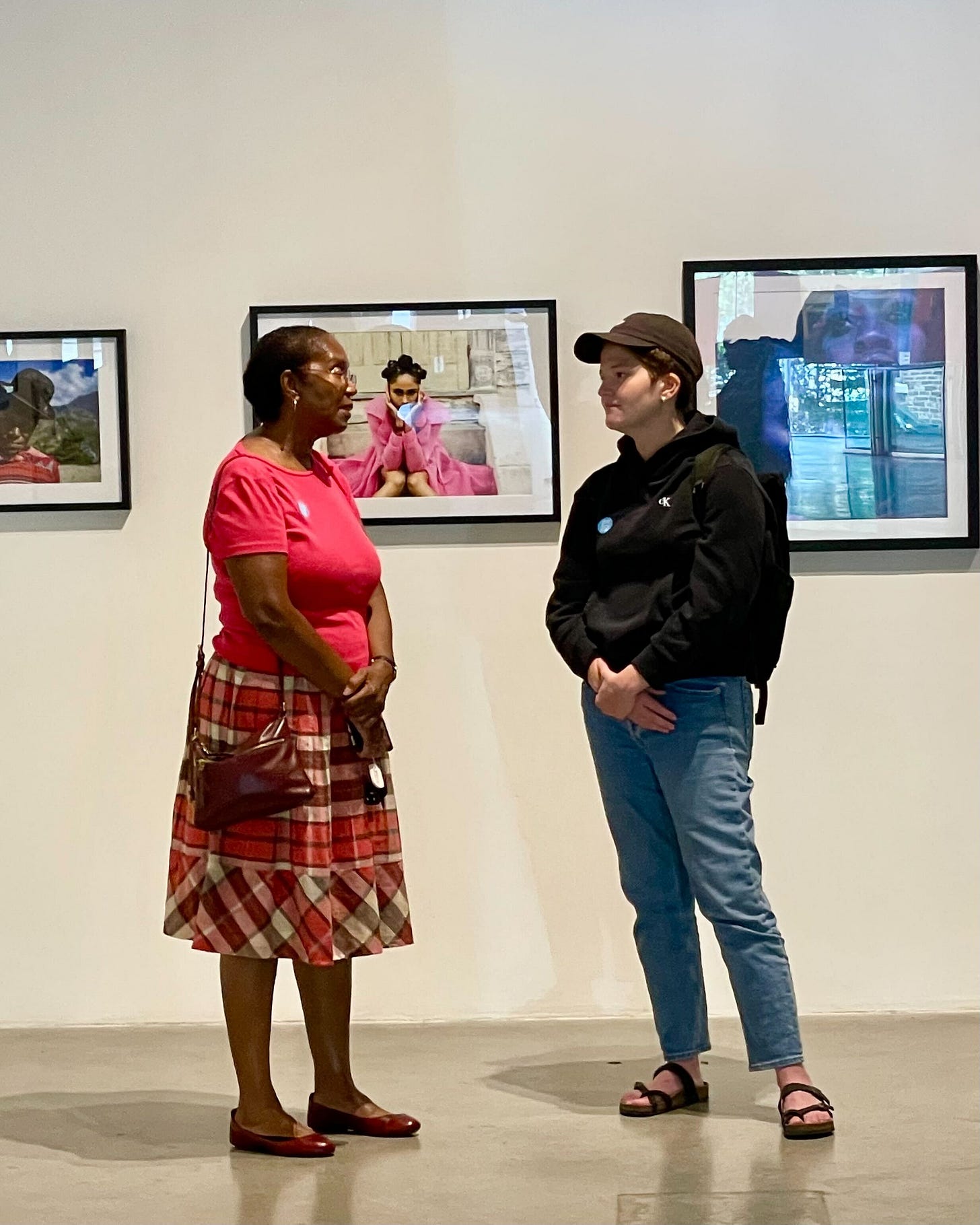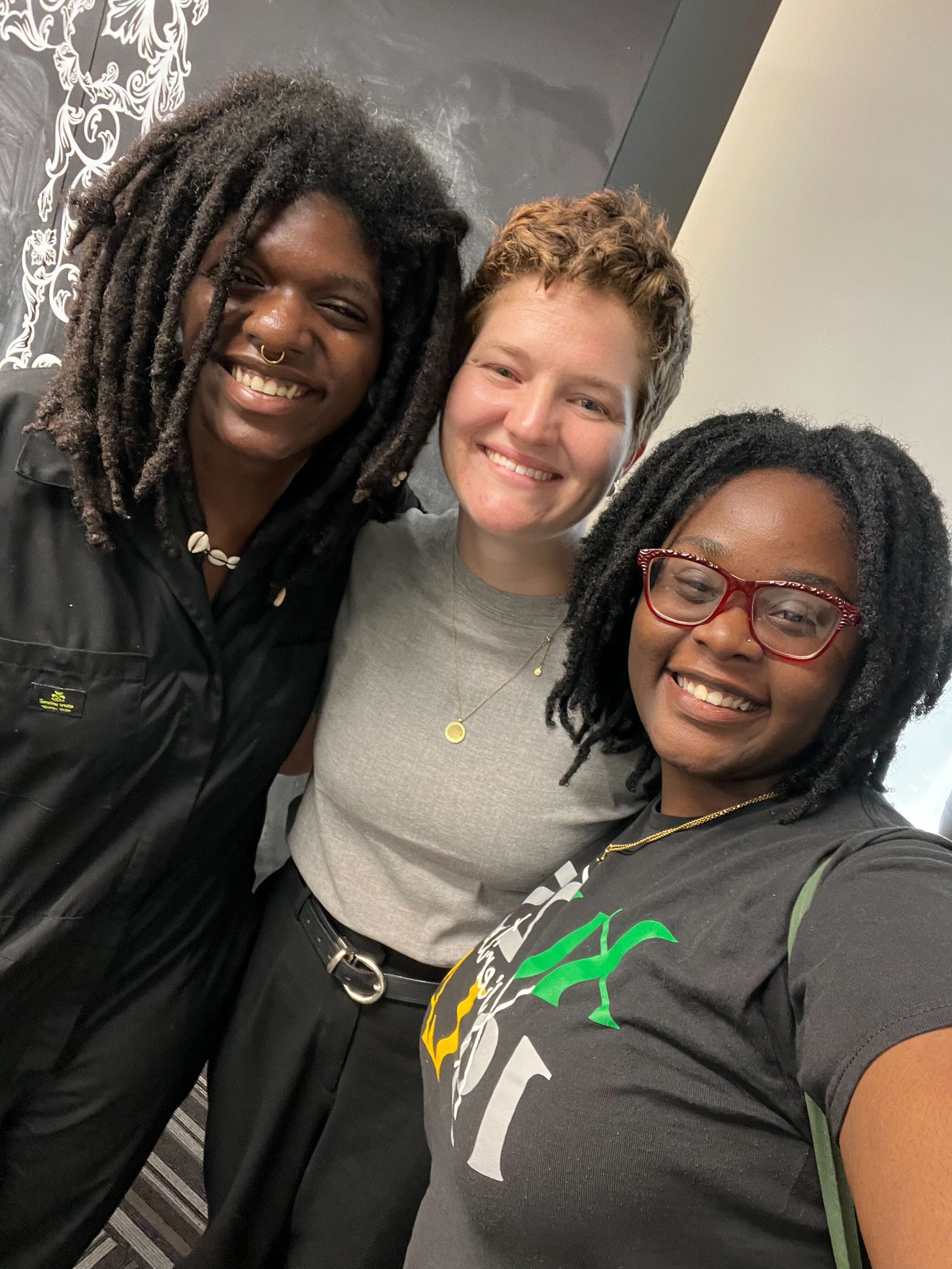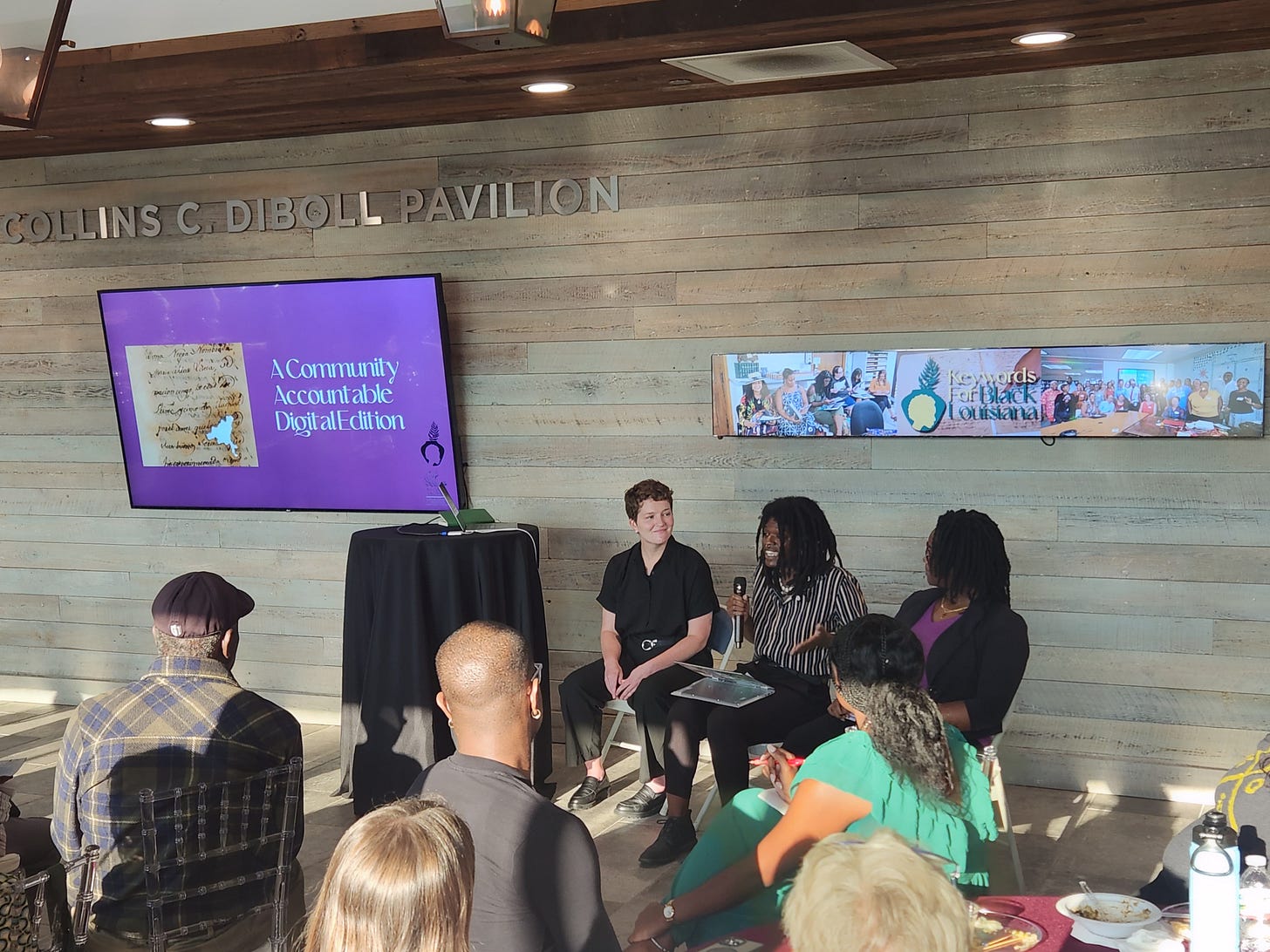Student Spotlight: Ellie Palazzolo
One of the original leaders of Keywords for Black Louisiana talks to us about doing digital humanities, the impact of Keywords, and listening to Janelle Monae’s music.
Introduce yourself. Are you a student, postdoc, faculty? With what institution? What do you do with LifexCode?
I am a 6th year PhD candidate in History at Johns Hopkins University and formerly the Co-Project Manager and Digital Curation Fellow at Keywords for Black Louisiana. I am also the co-host of the Digital Humanities workshop.
You’ve been involved with LifexCode since it began. When exactly did you join and what inspired you to get involved in digital humanities?
I joined LifexCode in Fall of 2020. I started in the History program at JHU in 2019, and was really interested in Atlantic history and foodways/food studies. I had been working on a senior thesis on a family of Black caterers in 19th century Philadelphia, which got me interested in the intersection of Black Studies and food studies. I combined that with my interest in French and the Atlantic world and decided to work on New Orleans for my First Year Paper [editor’s note: a project for first year PhD students at JHU], and did a First Year field with Dr. Johnson. She asked if I wanted to join LifexCode because of my work on New Orleans, I think. I didn’t have former experience with digital humanities or anything super computer-y, but I love to say "yes" and I was ready to try new types of work—mix things up.
How has LifexCode grown since then?
There were three projects in LxC at the time, one of which was Louisiana Colonial Documents (LA Colonial), which is now Keywords for Black Louisiana. I was drawn to Keywords because of my background in French language, and I was studying 18th century history for some of my comprehensive exams, so it seemed like a cool opportunity to research French documents. As I was reading the documents, trying to figure out the handwriting, I realized that it might not have as much long term relevance for my research, compared to my colleagues who were studying colonial history. I began to wonder what the digital humanities aspect of the project was going to look like, and whether I might pitch in there instead. I started reading about DH and was intrigued by it on a theoretical level and liked looking at other projects, so I asked the team if I could begin to invest my time into the DH side of things instead of in the documents. Thankfully, they also said "yes"!
Can you tell us more about what you found compelling about digital humanities?
The text I started with was New Digital Worlds by Roopika Risam, which is a historical approach to DH and media studies and the constraints and opportunities that technology can bring. The humanities approach to technology opened my eyes to contemporary issues around things like data, surveillance, algorithms, and AI, and helped me see how how that’s imbued in the construction of the archive and historical knowledge. I was interested in the long story of what is digital, or data, or intelligence, and how that mapped onto historical research. It seemed a complementary tool to historiography—the technical side of things—to ask a question of how we know what we know as historians and scholars, especially in the 19th and 20th centuries. Also, we were beginning this work in the Fall of 2020, when questions about Black history and public schools, especially in the South, were really visibly coming under fire. Public archiving and presentation of this information was at a high point. These issues kept me interested and invested in the project; the potential impact felt and continues to feel tangible and significant.
Above: Ellie with Dr. Eva Baham (Dillard University/Southern University, K4BL Community Team).
Tell me more about Keywords. What’s something that it has achieved?
Yeah! Our big achievement is our sites being published in August: docs.k4bl.org and stories.k4bl.org. The background story is that over the course of the 2010s, the Louisiana Historical Center digitized more than 100,000 pages of manuscript documents from French and Spanish colonial Louisiana. During this digitization, they added a lot of metadata, describing people by name when available, and occasionally occupations and geographies, but there were a lot of instances in which people who were not named in the documents, particularly Black and Indigenous people, did not appear in the tags from the metadata. For instance, if the document mentioned “an enslaved person” or "a maroon," then they would not be tagged as people in the documents, which made it harder to find their stories. The handwriting is also hard to read, and the documents are not accessible to people without French and Spanish language skills. So the original goals were to translate, transcribe, and recover the unnamed Black and African-descended people, while using keywords to create connections across the documents.
How many people are now on the Keywords team?
We started with 4 researchers and Dr. Johnson. Now, there are probably almost 100 people affiliated with the project in some capacity, but about 20-25 people who have their hands in the project on a weekly basis. The growth of the project began in Spring 2021 when we partnered with Dr. Guadalupe Garcia’s “Out of the Archives” class at Tulane University. This was when we started recruiting outside researchers, especially student researchers from Tulane. Over the course of that year, we were also applying for the planning grant with the NHPRC. Getting that grant allowed us to hire more researchers from JHU, Howard, Tulane, and eventually Dillard and Xavier. We have undergraduates from Dillard and Xavier who have been working on the project for a while now. We have also been able to bring people on to the digital team, even if they don’t have French or Spanish language skills. Olivia [Barnard] is the only person left from the original team, but there are still a lot of people who have been involved for 2-3 years.
We also added to our cohort of Subject Matter Specialists, which is a group of senior scholars in colonial Louisiana History who do editorial reviews of our documents in advance of publication. And we have developed a Community Circle & Advisory Board, consisting of Black, Louisiana-based historians, scholars, public educators, creatives, and cultural workers. We meet with them at least twice a year to check on how the project is going and get feedback from them.
How have those involved been impacted by K4BL?
Many ways! First, I’ve heard all the researchers involved say it has had a marked improvement on their research skills as academics. Second, the community engagement piece is a really distinctive, important window into seeing the consequences and rewards of scholarship and academic work that is accountable to a community, people who care about what you are doing and take it very seriously. That’s a perspective that I wouldn’t have necessarily gotten working on my individual research so early in my career. Some faculty on the Community Circle & Advisory Board have used or are going to use our documents for assignments. Nyla Williams, an undergraduate at Xavier University, is working on a curriculum development project and that can hopefully get these documents into the classroom, where students may find these stories inspiring and informative. We’ve also put effort into thinking about making our documents available for genealogical research.
Above, left to right: Chenise Calhoun, Ellie, and Jamya Davis at the K4BL Launch in New Orleans.
What is something you have done with LifexCode that you are especially proud of or was a particularly memorable experience?
The workshops and site launch are the obvious answers, but one of my favorites memories is going to the Digital Caucus at the American Studies Association last year [2023] with Chenise [Calhoun] and putting Keywords side by side with other digital humanities projects, even if they were not historical (like one was a study of Black YouTube, and another discussed a mural in Los Angeles). We were in conversation with two projects that were broadly DH projects, but not related to Keywords, and it was awesome to be involved in big DH conversations even if our project was not intuitively related to theirs.
Another fun thing over the last few months was when Jamya [Davis, undergraduate at XULA], who has been with the Keywords Digital Team for two years, took a leadership role and guided a team of interns in developing descriptions for the keywords on our website. It was great to see her and Zaria [El-Fil, doctoral candidate at University of Chicago] develop a program with interns. She absolutely crushed it with being able to make decisions and being a super confident and professional leader, and ultimately helping her peers create awesome work. As a teacher and a collaborator, it’s great to see people practicing useful skills, like planning and leading meetings, outside of the classroom. It felt like an evident example of the things that we do translating both specifically and broadly.
Above, left to right: Ellie, Chenise Calhoun, and Jamya Davis at the K4BL Launch in New Orleans.
What is one piece of media, broadly defined, that inspires your work?
A piece of media that I think about a lot in the context of doing DH, or DH against enclosure is the album and especially emotion picture Dirty Computer by Janelle Monae. Like a lot of Monae's work, I interpret Dirty Computer as an active and productive challenge to a homogenous digital world and the entanglements of technology with dehumanization, capital, and social control. It has inspired me to think a little differently about how the digital fits in the real world, and more capaciously about digital worldbuilding.
As far as my work overall, or work in terms of a commitment to the pursuit and creation of knowledge, one book that I love and also reflect on often is one of Susan Sontag's novels, The Volcano Lover. It's a work of historical fiction set mostly in Naples during the late 18th century The characters are, in my reading, continuously challenged to consider their relationships to acquisition of knowledge, materials, experiences as well as to one another as pathways or obstacles to self transformation. It helps me take a step back and think about the purpose behind doing the type of learning that we do as scholars—which can at times tend towards collecting—and how to instead let it change me, and hopefully also make the world a little bit better.
But, in terms of my playlists day to day? Boygenius, Japanese Breakfast, SZA, and recently, like everyone else, Chappell Roan.
What DH tools, methods, or theories do you recommend for folks exploring digital humanities against enclosure?
Anything that is free and open access! The Knight Lab out of Northwestern University offers open-access version of things like a story map or a timeline. People also love Twine because it’s an interactive storymaking platform. The journal Digital Humanities Quarterly is a treasure trove of reviews and theoretical work; I would especially recommend looking at its special issue on minimal computing in the longer term—that could be intimidating for people just jumping in but down the road is very cool and important.
What do you like to do in your free time or how do you recharge? We like to prioritize rest as part of our decolonial praxis.
I like to read for fun; I like to take a little walk here and there. I’m a food historian, so I like cooking and especially dining. Grad school has been an unexpectedly great opportunity for traveling, too, which I love—going to visit friends or to conferences and working and exploring in different places.
Is there anything I didn’t ask about that you want to share?
My non-DH world is studying the industrialization of the food system in the late 19th and early 20th century—how consumers and workers relationships' to food production changed, and how social and political conflict around race, reconciliation, and immigration came to fit into the modern food system. That’s my dissertation! And save the dates for our next two Digital Humanities Workshop meetings on October 24 and November 21!
Visit keywordsforblacklouisiana.org for more!
Follow Ellie on X.
This interview was conducted and has been edited for space and clarity by Dr. Brooke Lansing Mai.







